#tasty meta
Explore tagged Tumblr posts
Text
One thing I've been thinking of since the time limited on the time travel was revealed in episode 3 is whether Kawi is ever going to be able to completely "fix" everything in the past so that his present is what he wants or if, at some point, he's going to confronted with the fact that no matter how much work he puts into the past, to actually achieve what he wants he's going to also have to put equal efforts into his present.
I genuinely wouldn't be surprised if, at the end of the series, Kawi finds himself in a present that isn't a complete mess but which still isn't what he dreams of (i.e some of his key and most meaningful relationships are still broken/hanging on by a thread and his career isn't what he knows it could be, etc) with no way of going back. It would force him into a situation where he can't go back to fix his mistakes or stop them from happening and instead has to make amends and take accountability for his past actions in the present. Because that's something he needs to learn, that he will continue make mistakes as long as he lives (we all will) but that he can also try to fix them by being in the present and working towards the future.
You can't live in the past forever, and you shouldn't want to either.
154 notes
·
View notes
Text
#yes correct#like on the one hand Dean being just. OUTRAGEOUSLY horny for this Very Middle Aged Dad Lookin Guy is peak comedy#but on the other hand the entire universe is cosmically horny for Cas#literally ONLY Dean is sexier to The Universe At Large than Cas is and that's because God Himself wants to fuck Dean#this we must acknowledge#(we must also acknowledge that somehow both Misha Collins and Jimmy Novak are less hot than Cas despite having the same face) via @ilarual
Everyone but Dean thinking Cas is Just Okay Looking is funny and all except that he's canonically described by everyone from Random Christian Mom #3 to the King of Hell as sexy, dreamy, etc. A woman found him wandering naked by a river and said That's Husband Material. Amelia Novak let that face through her front door after he ditched her and their kid for over a year. He led half of Heaven in a rebellion on a scale only thee Devil himself had ever managed before. He's so hot he made Meg switch sides. Even after his Third Epic Fuckup most of the angels were down to follow him. The scribe of god took one look at him and said if Dean is God's main character, You are Mine, I will kill him to give you a Tragic Backstory.
Only Amara, terminal Deangirl and Sam, terminally heterosexual, have ever thought Castiel was anything less than the hottest motherfucker in the garrison.
#sorry had to add those tags because they're right and hilarious#cas my best friend cas#spn#tasty meta
2K notes
·
View notes
Text
God Ashton clocked Ludinus' ass so damn hard. "You immediately went to the end of an age. You had to be reminded about the beginning of a new one. That tells me a lot about where you are at."
I think the way some of the Hells tried to catch Ludinus out in having grander ambitions or not *really* believing in his cause or what-have-you missed the mark. I think he was in fact, honestly, a true believer. But the source of that belief, the goal of it, came more from a place of wanting to punish the gods rather than uplift humanity, such as it is. He might have wrapped it up in a grand idea of granting total mortal autonomy but it was secondary to the destruction of the systems he despised. He was alive a millenium and what did he do to improve humanity's lot in the meantime? Nothing. This is not a man who would do any lowly work to improve the conditions of those the gods have left behind already. And that's why, even beyond hurting people they care about, he never had a chance of the Hells, because caring about the discarded, the monstrous, the unloved is their whole thing. Ludinus might have some valid criticisms, and the Hells might align with him in some ways. He might have built his power specifically to dismantle an unjust system. He might regret the collateral damage to some degree. But in the end his mindset was punitive and destructive above all else.
That's why not him. Never him.
173 notes
·
View notes
Text


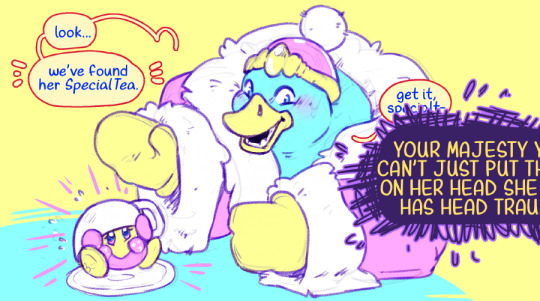
this is probably why meta knight moved the conversation to the hallway
based on @das-a-kirby-blog's comic based on my comic. comic inception. colour palettes are from das.
#just to be clear 100% of the colours here are yoinked straight from das' work as an homage!! i did not come up with these#unfortunately the crisp and tasty colour palettes only look their best if you have really banger lineart like das does but ah well#sorry this is the saga that just keeps going but i couldn't shake this when i thought of it. they're so annoying to each other#also a pal said that meta knight and starstruck's vibe is “your dad and the pet he told you not to get” and i think they're right#(though they are similar in age. just want to clarify this in case someone else runs with that gag. they are more romo than familial)#anyway... someday i'll do the tasks i'm supposed to do but not today!! ha ha!#meta knight#king dedede#starstruck dee#my art#my comics#gravitational collapse
465 notes
·
View notes
Text
thinking about caitvi but specifically the fact that caitlyn was the only person vi had left after she denounced jinx and she tried so hard to Be what caitlyn wanted but it was never enough because caitlyn wrapped herself so tight in grief and fury that she can't really see vi through the smoke anymore. "her blood runs through your veins." she sees jinx's sister defending her again, preventing cait from taking the shot. the shot that killed her mother. and vi cares so much about this kid that wouldn't have even gotten hurt because cait simply wouldn't have hit her. she could have only hit jinx. that was all she wanted her only goal and when vi defended an innocent, she took back all of the grace that she'd given vi and left her powerless again. can anyone hear me.
#arcane#arcane spoilers#arcane season 2#caitlyn kiramman#vi arcane#caitvi#meta#clarifying i do not hate either of them#the drama is just tasty#cait's privileged and vi is stuck in the pasy#past*
77 notes
·
View notes
Text
This meta is amazing and on a completely tangential note: kabrus main interest is in understanding people; the fact that he took this complex drama of human desire, theoretically all of the things that he is interested in, and focused on simplifying it says INSANE things about how much he is obsessed with Laios. I need a long rest.
"mithrun is the only real monsterfucker in dungeon meshi" is objectively the funniest bit you can get out of his everything, but in all seriousness i think his attraction to his love interest is deliberately overstated—and that makes sense, because romantic jealousy is a classic and digestible motive, which is explicitly what kabru was aiming for in condensing mithrun's backstory, and also because until chapter 94, mithrun wasn't willing to admit to the true nature of his desires.


but because romantic envy is both classic and digestible, it probably isn’t a unique enough or complicated enough desire to tempt a demon’s appetite. mithrun’s wish, as far as we can figure from kabru’s reduced retelling, was to have a life in which he had never become one of the canaries, and that carries like 3857 implications and desires within it. that’s delicious. his love interest acts as sort of a red herring to his motivation for making it, though. (side note: i'm saying "love interest" here because, keeping in mind that i barely speak japanese on a good day anymore, "想い人" is something i'd usually take as just kind of an old-fashioned and romantic way to refer to a lover, but in context i wonder if both the connotation of yearning and the vagueness are intentional, and i think this phrasing gets those aspects of it more effectively. anyway.)
mithrun considered his love interest to be untrustworthy. there was a minute where i thought that comment might be about a similar-looking elf (yugin, one of his squad members), but comparing the two…
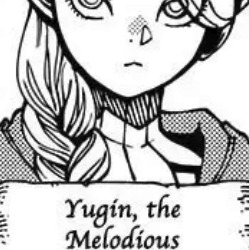

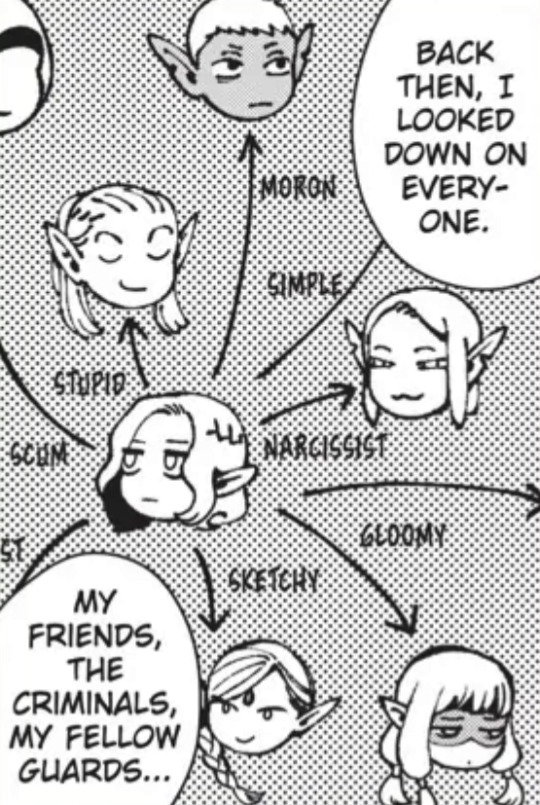
the "sketchy" arrow is definitely referring to the elf we know as his love interest—the bangs go toward her right, she only has the one forehead ornament, and, most notably, her ears aren't notched.
every time she’s given a full-body depiction in his dungeon, she’s drawn as a chimera, with the body of a snake from the waist down. (side note: the “what if a dungeon has chimeras before reaching level 4?”/“then the dungeon lord is unstable” exchange just being mithrun grilling his past self alive is so funny. he’s so. but anyway) there are a couple things about this.
first, the snake part of the chimera appears to be modeled after some species of coral snake mimic

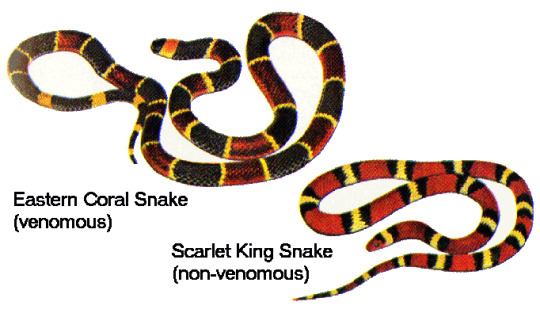
which, in the biology-for-fun manga, i… doubt is a coincidence, especially with the added context of the “untrustworthy” comment. the dungeon’s conjured illusion of mithrun’s love interest was a harmless copycat of a venomous original. for whatever reason, he felt this person was a threat and made up a "safe" version of her to be in a relationship with, and while it’s definitely possible to be attracted to or even love someone you find to be toxic and/or intimidating, when you take that into consideration alongside the configuration of her body, you get some interesting implications.
which brings us to our second point: if we assume that mithrun was not in fact fucking a snake, then sexual attraction, at least, was so far removed from his idea of a relationship with this person that he did not even bother to keep her dungeon copy human enough to maintain the illusion of the option of a sexual relationship. this is somewhat echoed in the depictions of their interactions, which also imply a frankly unexpected romantic distance. she kisses his cheek and he doesn't seem to react; she's at the edge of a narrow bed with only one set of pillows, on top of his blankets while he's underneath them.
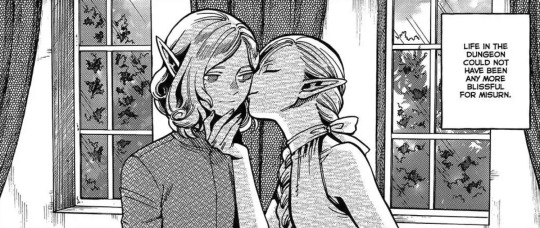
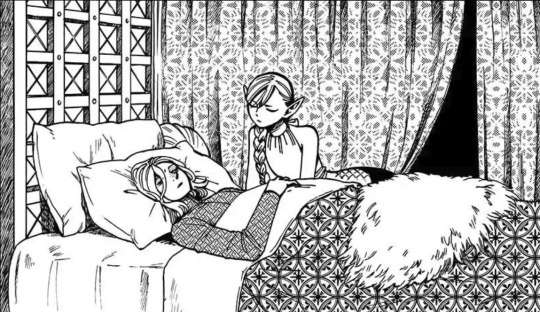
the kiss is particularly interesting because it seems to contrast the text. kabru's narration tells us this was everything mithrun could have asked for, but mithrun is there looking unreadable to pensive, likely because this is right before the panel that makes it clear things in the dungeon are beginning to go wrong.
walking through this backwards for a minute, we have the physical barrier of his bedding and the spatial separation inherent in a bed made for one person, the emotional barrier of his mounting anxiety getting in the way of his ability to enjoy the affection he sought, and... the snake, which historically carries the connotation of temptation, yes, but also mistrust, barring physical intimacy. okay. ok. if a dungeon reflects the mentality of its lord, all of this might suggest that mithrun was not able to have any real desire for a relationship with this person. his unwillingness to be vulnerable or let another person in was insurmountable. but in that case, why was she such a focal point that she remained to the end, after his dungeon had stopped creating iterations of his friends to come and visit him? why would he get so upset over her meeting with his brother that he became lord of a dungeon about it?
well. mithrun's brother was also interested in her, probably genuinely. and mithrun had to win.
you have an older brother who your parents completely ignore, probably in part because he is chronically ill/disabled and almost definitely in part because he received a ton of recessive traits that resulted in rumors that he was an illegitimate child. you are aware, most likely because those same parents fucking told you, that you actually are an illegitimate child. but they keep you around because you had the good fortune of looking just like your mother. what can that possibly teach you but that you, like your brother, are disposable?
it's utterly unsurprising that mithrun, under these circumstances, developed a pathological need to be better than everyone around him. people don't keep you otherwise. i'd argue this is also why he says he looked down on everyone he knew while milsiril claims his dungeon reeked of feelings of inferiority—he sought out people's worst traits and prioritized them in his mind to protect his already extremely fragile sense of self-worth, and all the while he tried to be as likable and high-performing as he possibly could be. his parents disposed of him anyway, but even then he tried to keep up the performance. he was kind to everyone. he never once lost to a dungeon.
when he saw his "love interest" meeting up with his brother, what he saw was himself being replaced by a person his parents had always treated as worthless, and if that was what they thought of the child they'd kept, what value could anyone possibly see in the bastard they'd given away to die? mithrun and kabru tell the story like he wanted to win this unnamed elf's heart, but it was never about being with her. it was about cementing his worth, proving that he didn't deserve to be thrown away.
and so it's particularly cruel that his demon discarded him, too. but maybe it's also particularly gentle that, in the end, there was someone who refused to even consider giving up on him.
kui laid it out in three panels better than i could hope to.
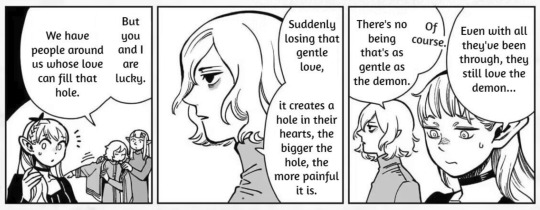
yeah. it's love. you wanted to be loved, even when the only way you were able to understand it was through the desire to be wanted, and you wanted that so badly that the idea of being consumed felt like the promise of finally mattering to someone.
#Dungeon meshi#Tasty meta#My post now#He is putting together an instagram reel of a documentary so he can talk about it with his crush Insane#KABRU THATS A HUMAN PERSON IN FRONT OF YOU#Insane. im going insane
10K notes
·
View notes
Text
woke up thinking abt how yuuta is suguru’s mirror. nobody speak 2 me
#i think they’re soooooo so very similar#but also different at their core#i still need to think abt it more and also make a post abt it later maybe but ;;#i think yuuta is suguru’s true desires personified#i really really do#anyway . curse user!yuuta you would’ve been sooooo tasty#<3#ari noises ✩#meta ✩
63 notes
·
View notes
Text
Does anyone else think about how Tulip was avoiding look at her hand and subsequently her number.

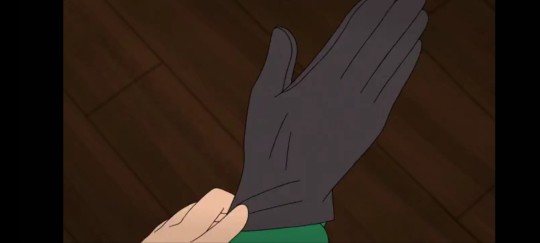
And only got over that fear because of Lake.
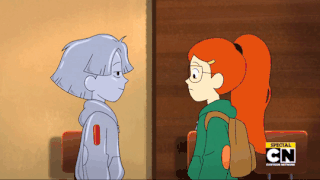
And Lake was constantly look at their hand and their lack of number?


#infinity train#infinity train lake#lake infinity train#infinity train book 2#tulip olsen#Infinity train book 1#I dunno what this connection is but man#infinity train meta#They mirror each other#Hahahahha *breaks down sobbing*#So many characters mirror or foil with Lake i think and the irony feels like someone ripping my intestines out every time#Theyd hate it but story wise its so so tasty ty#yellow's theories#<- bc i feel like i need to tag it as something of mine#yellow's meta
453 notes
·
View notes
Text
i watched mukōzuke the other day and i can’t stop thinking about that exchange between matthew and hannibal when matthew confirms that hannibal is the ripper.
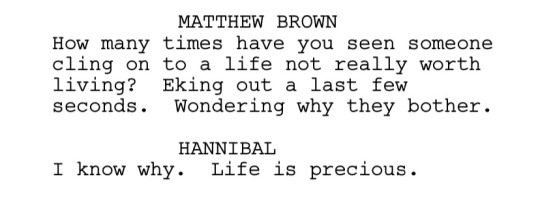
and this just demonstrates so perfectly why hannibal is unique to will and vice versa, why it couldn’t have been just anyone, any other killer, for either of them. most serial killers hold a general disregard for life, and hannibal’s statement sounds like an oxymoron for a killer.
but for will and hannibal it is the very fact that they hold the meaning of life in such high regard that drives their desire to kill, to take it from those unworthy. hannibal operates on his own system of what could loosely be called “morality.” he compares his efforts to gods’ after all. a more honest god in his capriciousness than the one most people worship, the one who is “offended” by the innocence of beings like his sister. and what is will if not a judge jury and executioner — a more just one than the brokenness of the criminal justice system that sent him to prison for crimes he didn’t commit?
it is hannibal’s and will’s respect for life that binds them, and this is why the end of the show is so perfect. will finally accepts his righteous anger as beautiful, ridding the world of those like dolarhyde who’s selfish, sexual and delusional needs slaughter without cause.
hunting is problem solving.
341 notes
·
View notes
Text
#s4 death Cas went from ally to friend#season 7 death Cas went from friend to what-could've-been situationship#season 9 very brief death-by-April Cas went from situationship to boyfriend (immediately estranged)#season 12/13 death Cas went from boyfriend to Partner™#and then the final death meant an upgrade to husband bc fuck it#if Dean has to be a widower AGAIN he's going to be acknowledged as such dammit via @ilarual
dean saying fuck it cas is my husband after cas dies is my favorite but i do think it’s kinda funny that whenever cas dies dean progresses their relationship
6K notes
·
View notes
Note
So given how oblivious dmk is, has he ever accused Mir Falspar of copying his style with the cracked armor?
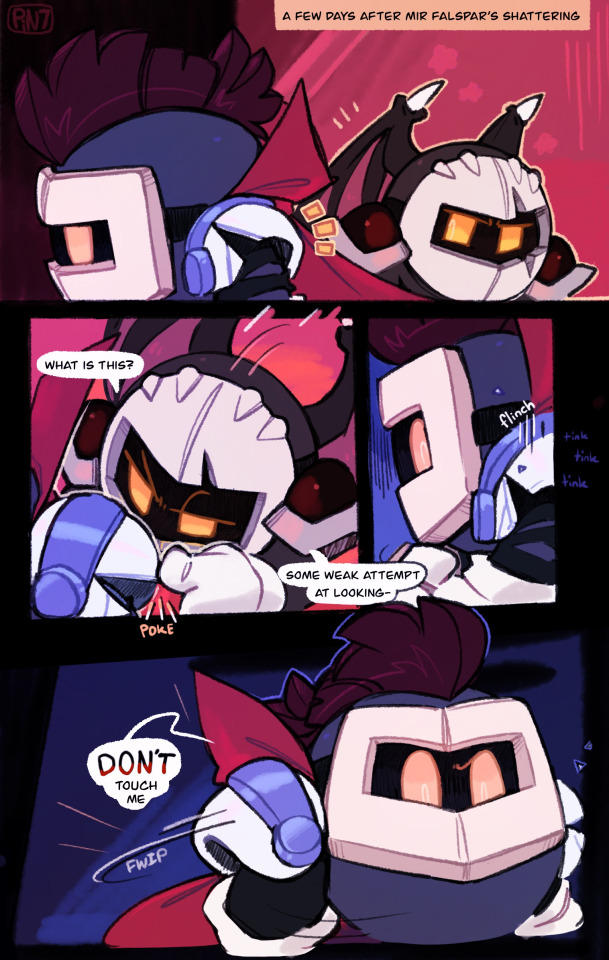

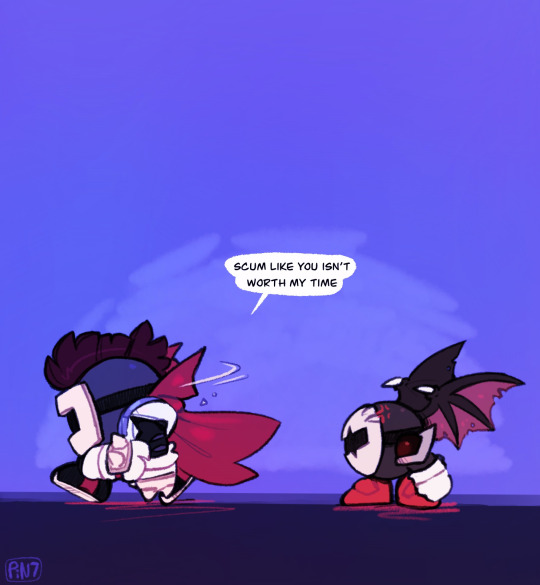
It didn't go over very well.
Bonus:
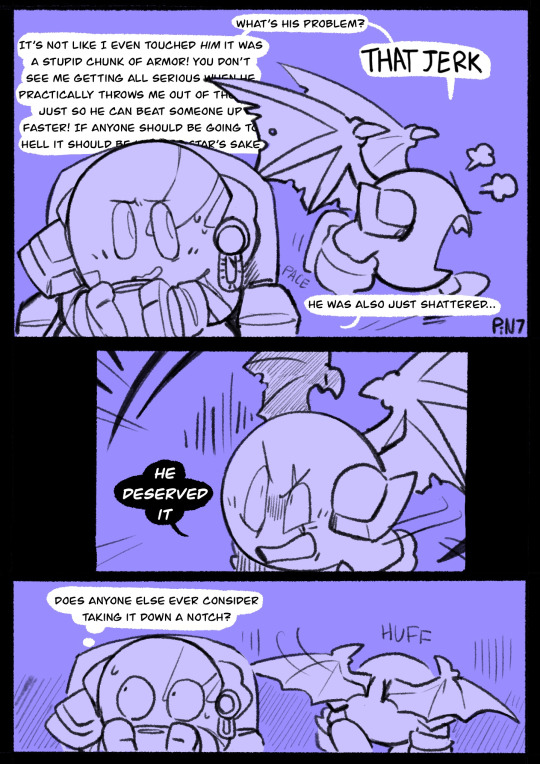
#post's rambles#post's art gallery#dark meta knight#mir falspar#kirby right back at ya#mir nonsurat#galaxy soldier army#mirrorverse fans I hope this one's tasty#going to reveal the breaking news that DMK truly thought that was a good conversation opener (he was incorrect)
357 notes
·
View notes
Text
Standing there. Drowning in the memories of Ruidis leeching Imogen's energy, of Will and Derrig dying, of Vax'ildan standing between Keyleth and death ("don't you even dare")—
The guilt. The anger. The agony.
This woman stands before him and says that Ludinus may be lost on his path, but she cannot argue with his philosophy. The gods must meet their ends.
A blade gripped tightly in his fist. The Wildmother's statue shining in a beam of moonlight. Hope in his voice. "The gods are watching—"
And Orym feels the weight of the whole fucking world on his chest. How can he support this? How can he stay silent?
He looks around the room. This is too big for him. He is a small man in a large world, and he has never felt that so deeply.
Orym clenches his jaw.
He drives his sword into the foundation and, eyes dark, joins them.
#cr spoilers#critical role#orym of the air ashari#cr meta#bells hells#LISTEN MAN IDK THIS WHOLE THING SMELLS#LIAM IS SO FROWNY AND SO AM I BUT ALSO HE NEEDS HIS PEOPLE BACK#sacrificing his morals to save his family. so spicy so tasty I'm chomping at the bit
367 notes
·
View notes
Text
Part of the reason I am so jazzed about the conversation with the Arch Heart is because it has removed the illusion of this being an easy choice. As Orym said, and as he has been operating on the assumption of, the people of Exandria are like ants to something like Predathos, likely to be crushed underfoot. Correct, yeah. But the point of the Arch Heart's responses was that the same is true of the gods. The world is faced with a scenario where one way or another, some power is very likely going to be unleashed and put quite a lot of people in danger. Unless they can somehow very quickly quell the gods' fear*, either the gods or Predathos will be freed and stomping ants.
That refocuses the question. People are going to die. The question is, how long will the danger go on? And what kind of world will be left, after?
Juicy!
#*this is it's own problem too#even if they succeed in buying themselves time to handle the Predathos situation without the gods breaking the Divine Gate#it is pretty fucked that they would essentially need to beg for the lives of how many people died in the calamity? 2/3 the population?#they would have to beg for the lives of 2/3 of the population to even get a chance to save the gods#I have always been team third solution and team they might not have to die but things need to change#so i am very excited to have the narrative more aggressively pointing that out now#things are fucked! there are no easy answers! you have to choose anyway!#tasty#critical role#cr spoilers#cr meta#i guess
42 notes
·
View notes
Text
You are so right and it really highlights how by the time we meet the dominion/founders, they have their whole song and dance down to an art.
They have managed to control the Jem'Hadar so well because they've engineered a race that's both virtually indestructible and easy to dispose of. Sure in a fight they're hard to kill, but they have an incredibly short lifespan, and are chemically reliant on the Founders. It's difficult to squash a movement, or a culture entirely, so they've never tried to do exactly that. They've just made it so the people they control have no time to bring their ideas to fruition, and more immediate things to worry about.
You see this with the Teplan blight too. They probably could have created a disease that just killed everyone, but the added horror that death can strike at any time and the fact that the act of researching accelerates the disease creates a population-wide hopelessness that destroyed a vibrant culture in just a few (artificially shortened) generations.
The Jem’Hardar are so interesting. Every time we linger on them it’s like we see the beginnings of a culture forming. Only to have it immediately crushed because all of them are killed.
The Jem’Hardar have so much potential. I hope more is done with their species than just being bad guys.

#the Teplan Blight is fucking diabolical#it's so simple and is pretty much reserved to the one episode#but the more you think about it the more fucked up it is#tasty meta#ds9
475 notes
·
View notes
Note
hi i'm the op of that post (stackslip) PLEASE elaborate on chainsaw man's metanarrative
hi! um. you've given me free reign, i hope you know what you're doing. anyway: fair warning in advance that this is based entirely on how i like to interpret and think of the csm story and doesn't necessarily hold true, partly because of the level of abstraction that i'm operating at here. i'm normal and i like metanarratives a normal amount. this might be a little long. but.
um. thinking about how protagonism in CSM is inflicted on denji by the author insert that is makima. i've brought up the Icon of chainsaw man before in my part 2 analyses but basically:
the Chainsaw Man is the role that denji occupies in the story, right? it's the title of the manga. it's what the public Sees him as. it's what makima quite literally produces. the relationship between denji and the chainsaw man in both aspiration and idealisation forms a major stem of both part 1 and part 2's narrative.
this production occurs on two levels: (1) what Chainsaw Man is, and should be, and (2) how denji is developed as a protagonist by makima.


"you don't get him at all." chainsaw man is her blorbie (i think i'm funny). the point is that the Presentation of chainsaw man, the one that the audience is initially set up to expect, is almost entirely synonymous with makima's version of the CSM that we get later. i think a lot about how part one borrows from, amplifies, and later subverts shounen tropes. the CSM as an idea persists in how it's discordant from denji's normality in part 2 but part 1's direction in how denji voluntarily inhabits the chainsaw is what i'm pointing at here. (there's a lot to be said about how denji's idealisation as tied to the icon of the CSM is intertwined with his wants but that's not relevant in this meta except in the minutiae of his adherence / resistance to this role.)
the thing is that makima is instrumental in pushing this role onto denji. she sees chainsaw man, he is chainsaw man. it's (and i sound insane here but please hold on, i beg) like writing.
i think her addressing him in the last battle scene, the "i'll kill you personally" is indicative of her finally divorcing denji from the chainsaw; forming The Chainsaw Man in full, while still obviously curating the denji that would support this formation throughout the story.
a small side here but: "but she never even saw me once, even from the start." // fujimoto's writing actively utilises characters towards the end goal of shaping the protagonist. this struggle here is one between a character and an author.
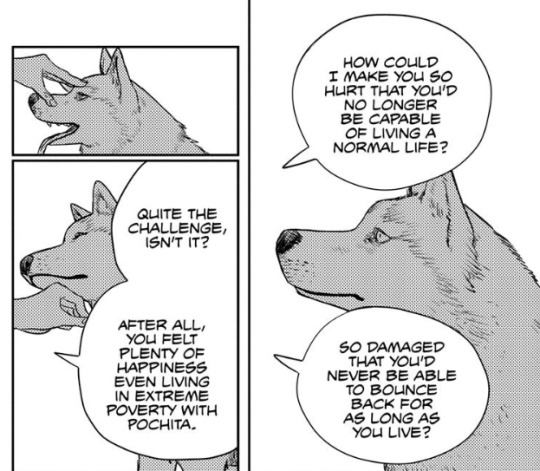

now continuing; the way that makima provides for and then systematically removes these initial connections simulates traditional story structures with its setup, its confrontation and resolution. her excellence as an antagonist rests upon her identity as a narrative device which develops the protagonist and pushes him through this structure. the conflicts and the loss that a protagonist usually naturally (at least in-world) goes through in a story are instead all artificially created by makima.
"how could i make you so hurt that you'd no longer be capable of living a normal life?" // her molding of denji isn't just passive emotional manipulation, it's active writing. she herself is aware of the tropes and the character relationships that are being built up, that are being subverted. she herself embodies, espouses and resolves the themes of multiple arcs (thinking of the end of the bomb devil and the darkness devil arc here / thinking of how she draws the shutters on ignorance and on wanting).
there's a lot i try to extrapolate from her commentary on movies during her date with denji especially in context with the story simulation that she herself is doing throughout the manga. i find it interesting how the ending to the movie date or the "good" movie founds itself on shared feeling: denji sees makima cry at the same movie as he does.
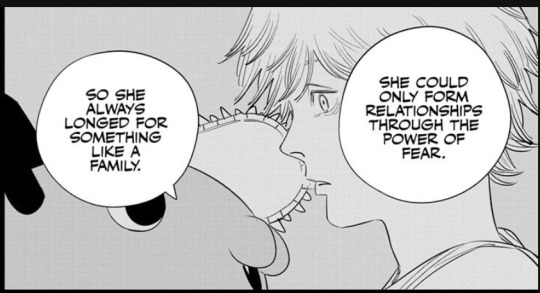
"the drinks yesterday were delicious." // you talked about her goals already in your post but makima's search for real intimacy (and equality in a relationship) coincides with denji's one. to me, it comes off as a writer trying to find a mirror of understanding in their own creation. the way she visualises the CSM (as "chaos" to her order) reveals a relationship quite like the flawed connection that one has with characters one makes: and this relationship is what denji (the 'stage' of this process) responds to so emphatically: "she wasn't looking at me this whoole time."
so, yeah; CSM to me operates at two levels: the one with the deeply human character relationships that construct the story and another layer where fiction and ideation mesh. it's important to note that this is something fjmt quite likes doing in his other work: using characters to specifically engage with the telling of his stories or exploring his characters' nuanced reactions to fiction and its weight.
thinking of makima as the 'Author' is misleading, though, and it ignores the fact that makima is both a device deployed by the actual author and in-world by the structure that are the higher ups. she is the control devil; she controls the scaffoldings of the story but she in herself is an agent of the author, of the narrative, of the aforementioned higher ups.
i don't know. is an artist ever truly original in their art? do they not operate within a greater structure, borrowing from and being regulated by it and its interpretation of their work? are makima's plans not ultimately upset by her creation?
denji materialises as a character from multiple active sources instead of the unitary source that makima believes herself to be. he's a passive character and yet he refuses to be a stable creation (psst. it's that universal tussle between the living art and the artist -- something fjmt's already tackled in his oneshots).
i don't know (2). this interpretation's been simmering in my head for a while, but i wasn't very Sure about it. but hm. this writeup primarily bases itself off part one (since it's well. complete) but image and image production specifically coming into fruition as a theme in part two makes me feel increasingly confident in this interpretation. it's strange how it somehow all ties back into storytelling.
#this is because i'm so writingpilled metacelled at all times. literally.#like. i'm obsessed w reze as of now but that Thing that was makiden throughout the manga. actually still has me in a chokehold.#taps makima and denji -- these two can fit so many Themes into them.#and even part 2's grappling with structure#and how devils are written also as roles and through their interpretations. so so tasty#chainsaw man#csm meta#chainsaw man meta#makima#denji#crow.txt#crow.asks#stackslip#<- is it OK if i tag this? thank you so so much for the ask
80 notes
·
View notes
Text
I very much understand why Nick is always so receptive to Boston cajoling him with sex.
They are super compatible in bed and Boston particularly is a very passionate and attentive lover. Compare him fucking Top and Gap to his sex with Nick: I would say that the sex he has with Nick is intimate to say the least.
And Nick craves to be loved by Boston, even if he's understood that he can never get it, what he IS getting is true affection so it's no wonder to me why he "gives in" every time.
#only friends#only friends the series#bostonxnick#bostonnick#I would love to post sth besides bostonnick but I love their dynamic - I feel there's a lot out there about the others but bostonnick posts#are often channelled hatred towards Boston + poor baby Nick (which fair) but their whole thing is so tasty#loved the whole onion peeling of his dad being big in the message parlor business transitioning into politics to the layer where he can go#nd leave anytime to NY#his dad doesn't seem to care that much that Boston won't do his business degree nevertheless Boston IS still there#that is so interesting to me#photography is his passion so going to NY immediately would make sense and even lessen the potential of blackmail affecting his dad#but for now he is staying! and I want to know why#high-fives the people who write meta on the ephemeral aspect of ofts#also one of the days I had to get up at 5 to make it to court so I can only spare so many braincells for posting
60 notes
·
View notes